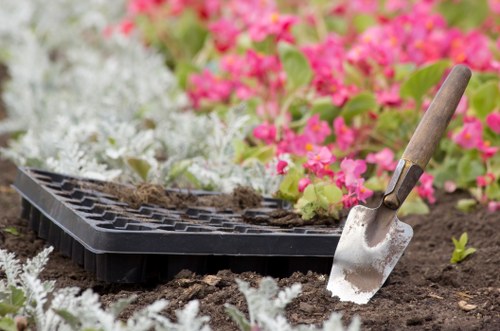Effective Oil Stain Removal for Driveways in Church End

Oil stains on driveways are not only unsightly but can also cause long-term damage to your pavement. In Church End, homeowners often face this issue due to various reasons such as vehicle leaks, accidental spills, or industrial activities nearby. Removing these stains promptly and effectively is crucial to maintaining the curb appeal and structural integrity of your driveway.
Understanding the best methods for oil stain removal can save you time and money. Whether you prefer DIY solutions or professional services, knowing the right approach ensures that your driveway remains clean and free from persistent stains.
This comprehensive guide explores the most effective techniques for oil stain removal in Church End, catering to different types of driveways and stain severities. By following these methods, you can restore your driveway to its original condition with ease.
Causes of Oil Stains on Driveways

Oil stains on driveways can originate from various sources. Identifying the cause is the first step toward effective removal.
Vehicle Leaks: Cars, motorcycles, and other vehicles can leak oil, transmission fluid, or other lubricants onto your driveway.
Accidental Spills: Accidental spills during refueling, maintenance, or transporting oil-based products can lead to stains.
Industrial Activities: Nearby industrial sites may contribute to oil residue through runoff or air deposition.
Types of Driveways and Their Vulnerability

Different driveway materials react differently to oil stains. Understanding your driveway type helps in selecting the appropriate removal method.
- Concrete Driveways: Porous and absorbent, making oil stains more challenging to remove.
- Asphalt Driveways: Similar to concrete but slightly less porous, requiring specific treatment.
- Stone or Brick Driveways: More resistant to stains but may require specialized cleaners.
Choosing the right removal technique based on your driveway material ensures effective and lasting results.
DIY Oil Stain Removal Methods

For homeowners who prefer tackling oil stains themselves, several DIY methods can be both effective and economical.
Using Absorbent Materials
Absorbent materials like cat litter, baking soda, or sawdust can help soak up fresh oil spills.
- Sprinkle a generous amount over the stain.
- Allow it to sit for several hours or overnight.
- Sweep up the absorbent material and dispose of it properly.
- Repeat if necessary for stubborn stains.
This method is best suited for recent spills and minor stains.
Degreaser Solutions
Commercial degreasers are specifically formulated to break down oil residues.
- Apply the degreaser according to the manufacturer's instructions.
- Let it sit for the recommended time.
- Scrub the area with a stiff brush.
- Rinse thoroughly with water.
Ensure you wear protective gloves and follow safety guidelines when using chemical cleaners.
Eco-Friendly Alternatives
For those seeking environmentally friendly options, natural ingredients can effectively remove oil stains.
- Dish Soap and Hot Water: Mix dish soap with hot water and apply to the stain. Scrub and rinse.
- Vinegar and Baking Soda: Sprinkle baking soda over the stain, spray with vinegar, let it fizz, then scrub and rinse.
These methods are safer for the environment and still provide good results.
Professional Oil Stain Removal Services

While DIY methods can be effective, hiring professionals ensures thorough and permanent stain removal.
Benefits of Professional Services
- Expertise in handling various types of stains and driveway materials.
- Access to specialized equipment and high-quality cleaning agents.
- Time-efficient and hassle-free.
- Long-term protection against future stains.
Choosing the Right Service Provider
When selecting a professional oil stain removal service in Church End, consider the following:
- Reputation and customer reviews.
- Experience with your specific driveway type.
- Availability of guarantees or warranties.
- Competitive pricing and transparent quotes.
Researching and selecting a reputable provider ensures you receive quality service and satisfactory results.
Cost Considerations
The cost of professional oil stain removal varies based on several factors:
- Extent and severity of the stains.
- Size of the driveway.
- Type of cleaning methods used.
- Additional services like sealing or maintenance.
Obtaining multiple quotes can help you find a service that fits your budget while meeting your needs.
Preventing Future Oil Stains
Prevention is always better than cure. Implementing preventive measures can keep your driveway free from oil stains.
Regular Vehicle Maintenance
Ensuring your vehicle is well-maintained reduces the risk of leaks that cause oil stains.
- Regularly check for oil leaks.
- Address mechanical issues promptly.
- Use drip pans during maintenance.
Seal Your Driveway
Applying a sealant creates a protective barrier on your driveway surface.
- Sealants prevent oil from penetrating the pavement.
- They make future stain removal easier.
- Regular sealing enhances the longevity of your driveway.
Use Protective Mats
Placing mats or trays under vehicles can catch drips and spills.
- Especially useful for cars prone to leaks.
- Easy to clean and maintain.
These simple steps can significantly reduce the occurrence of oil stains.
Local Solutions in Church End
Church End offers a variety of local solutions for oil stain removal, whether you prefer DIY or professional services.
Local Suppliers
Several local suppliers in Church End provide quality cleaning agents and absorbent materials tailored for oil stain removal.
- Church End Cleaning Supplies: Offers a wide range of degreasers and eco-friendly cleaners.
- Driveway Solutions: Specializes in products for concrete and asphalt maintenance.
Community Workshops
Engaging in community workshops can provide valuable tips and demonstrations on effective oil stain removal techniques.
- Learn from experienced professionals.
- Access hands-on experience with different cleaning methods.
Participating in these workshops enhances your knowledge and skills for maintaining a clean driveway.
Environmental Considerations
Removing oil stains responsibly ensures minimal impact on the environment.
Proper Disposal of Oil-Soaked Materials
Used absorbents and cleaning solutions can be hazardous. Follow local regulations for disposal.
- Contact local waste management services for guidance.
- Never pour oil or contaminated water down the drain.
Using Eco-Friendly Products
Opting for natural or biodegradable cleaning agents reduces environmental harm.
- Natural solutions like vinegar and baking soda are effective and safe.
- Biodegradable commercial cleaners minimize pollution.
Choosing eco-friendly options contributes to a healthier environment in Church End.
Preventing Runoff
Ensure that cleaning runoff does not flow into drains or natural water sources.
- Use barriers or containment methods during cleaning.
- Avoid excessive water usage that can spread contaminants.
Responsible cleaning practices protect the local ecosystem.
Maintenance Tips for a Stain-Free Driveway
Regular maintenance can keep your driveway looking pristine and free from oil stains.
Scheduled Cleaning
Implement a regular cleaning schedule to prevent the buildup of oil and other contaminants.
- Clean spills immediately.
- Conduct deep cleaning at least twice a year.
Inspect for Leaks
Regularly inspect your vehicles for any signs of leaks that could lead to stains.
- Check engine and exhaust systems.
- Address leaks promptly to prevent driveway damage.
Use Protective Coatings
Applying protective coatings adds an extra layer of defense against stains.
- Sealants prevent oil penetration.
- Regularly reapply coatings as recommended.
Consistent maintenance practices ensure long-term driveway health.
Choosing Eco-Friendly Cleaning Methods
Eco-friendly cleaning methods offer effective stain removal while being kind to the environment.
Biodegradable Cleaners
Select cleaners that break down naturally without leaving harmful residues.
- Look for products labeled biodegradable.
- Avoid those with harsh chemicals like phosphates.
Natural Absorbents
Use natural materials to absorb and lift oil stains.
- Baking soda and cornstarch are excellent for soaking up spills.
- Coffee grounds can also act as natural absorbents.
Steam Cleaning
Steam cleaning uses high-temperature steam to break down oil residues without chemicals.
- Effective for deep cleaning porous surfaces.
- Prevents chemical runoff into the environment.
Adopting these methods supports sustainability while maintaining your driveway.
Long-Term Solutions for Stain Prevention
Implementing long-term solutions can keep your driveway spotless for years.
Driveway Sealing
Regular sealing creates a barrier that repels oils and other stains.
- Apply sealant every 2-3 years.
- Choose high-quality sealants for better protection.
Landscaping Considerations
Strategic landscaping can divert spills away from your driveway.
- Install gravel beds or drainage systems.
- Use absorbent plants to capture runoff.
Regular Inspections
Conduct periodic inspections to identify and address issues early.
- Look for cracks or wear that can harbor stains.
- Repair damages promptly to prevent worsening.
Proactive measures ensure your driveway remains clean and damage-free.
Local Regulations and Compliance
Being aware of local regulations ensures your cleaning practices are compliant.
Waste Disposal Laws
Understand the guidelines for disposing of oil-contaminated materials.
- Never dispose of oil-soaked materials in regular trash.
- Use designated disposal facilities or services.
Environmental Protection Standards
Comply with standards that protect local water bodies and soil.
- Avoid practices that lead to runoff.
- Use approved cleaning products that meet environmental criteria.
Permits and Restrictions
Some cleaning methods may require permits or have restrictions.
- Check with Church End local authorities before large-scale cleaning operations.
- Ensure all activities are within legal boundaries.
Staying informed about regulations helps prevent legal issues and promotes responsible cleaning.
10-15 Nearby Areas to Church End
Church End is surrounded by several areas, each with unique features relevant to oil stain removal driveway services.
- Barkingside: Located just north, offering residents easy access to local cleaning services.
- Chigwell: Known for its stone driveways, requiring specialized stain removal techniques.
- Grange Hill: A residential area with a mix of concrete and asphalt driveways.
- Hainault: Features expansive driveways susceptible to oil leaks from multiple vehicles.
- Loughton: Close to Church End, providing various professional cleaning services.
- Highams Park: Offers eco-friendly solution providers focused on sustainable cleaning.
- South Woodford: Hosts community workshops on driveway maintenance and stain prevention.
- Snaresbrook: Residents often seek long-term sealing solutions for their driveways.
- Fairlop: Industrial areas nearby contribute to unique oil stain challenges.
- Wanstead: Combines urban and suburban areas, requiring versatile cleaning approaches.
- Woodford Green: Emphasizes the use of natural cleaning methods for driveway maintenance.
- Roding Valley: Known for its lush landscapes, prioritizing eco-friendly cleaning practices.
- Redbridge: Offers a wide range of professional services for oil stain removal.
- Wanstead Flats: Community-focused area with resources for driveway maintenance.
- Seven Kings: Engages local businesses in providing innovative cleaning solutions.
Conclusion
Oil stains on driveways can be a persistent and frustrating issue for homeowners in Church End. Whether opting for DIY methods or seeking professional assistance, understanding the best practices for stain removal and prevention is essential.
By following the strategies outlined in this guide, you can effectively manage oil stains, preserve the appearance of your driveway, and enhance the overall value of your property. Remember, timely action and regular maintenance are key to keeping your driveway clean and free from unsightly oil marks.
Investing in quality cleaning solutions and preventive measures not only addresses current stains but also safeguards against future occurrences, ensuring your driveway remains a beautiful and functional part of your home.
Frequently Asked Questions
1. What is the best DIY method for removing oil stains from a concrete driveway?
The most effective DIY method involves using a combination of baking soda and dish soap. First, cover the stain with baking soda and let it sit for a few hours to absorb the oil. Then, scrub the area with a mixture of dish soap and hot water, and rinse thoroughly. Repeat the process if necessary for stubborn stains.
2. How often should I seal my driveway to prevent oil stains?
It's recommended to seal your driveway every 2-3 years, depending on the level of traffic and exposure to the elements. Regular sealing creates a protective barrier that helps repel oil and other stains, extending the lifespan of your driveway.
3. Are eco-friendly cleaners as effective as commercial degreasers?
Yes, eco-friendly cleaners can be just as effective as commercial degreasers for removing oil stains. Products like vinegar, baking soda, and biodegradable detergents break down oil residues without harmful chemicals, making them a safer alternative for both your driveway and the environment.
4. When should I consider hiring a professional for oil stain removal?
You should consider hiring a professional if DIY methods fail to remove the stain, if the stain is extensive, or if your driveway material requires specialized treatment. Professionals have access to advanced equipment and expertise to handle stubborn stains effectively.
5. Can oil stains damage the structure of my driveway?
Yes, prolonged exposure to oil stains can penetrate the surface of your driveway, leading to deterioration and weakening of the pavement. Addressing oil stains promptly helps prevent long-term damage and maintains the structural integrity of your driveway.


